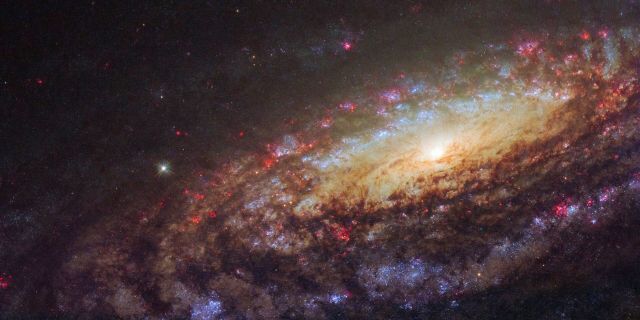NASA is confused: the Hubble telescope shows that "something strange" is happening to the Universe
NASA scientists are confused by the data sent to them by the Hubble telescope. According to these data, "something strange is happening to our universe," writes the Daily Express.
Anthony Ashkenaz (Antony Ashkenaz)
For the past 30 years, astronomers have used the Hubble Space Telescope to study the farthest corners of our universe. Now, after analyzing the data obtained from the telescope, scientists have come to the stunning conclusion that "something strange" is happening to our Universe. The telescope, launched in 1990, helped astronomers identify 40 "waypoints" of space and time that allow measuring the rate of expansion of the Universe.
However, now NASA scientists have discovered a discrepancy between the current rate of expansion and the rate that was immediately after the Big Bang, which happened about 14 billion years ago.
In its statement, the agency said the following: "Attempts to estimate the rate of expansion of the universe began in the 1920s with measurements by astronomers Edwin Hubble and Georges Lemaitre."
"This made it possible in 1998 to discover dark energy – a mysterious repulsive force that accelerates the expansion of the universe."
"Over the past few years, thanks to data obtained from Hubble and other telescopes, astronomers have discovered another interesting point, namely the discrepancy between the rate of expansion observed in the near Universe and the data of independent observations concerning the period immediately after the Big Bang, which predict a different rate of expansion.“
"The reason for this discrepancy remains a mystery."
"However, the data obtained from Hubble and covering a variety of space objects that serve as distance markers confirm the hypothesis that something strange is happening.“
With the help of more accurate data obtained from the Hubble telescope, astronomers were able to determine that the universe is expanding much faster than originally thought.
NASA scientists have previously predicted that the universe should expand at a speed of about 67.5 kilometers per second per megaparsec with a minimum error of only 1.3%. But new observations indicate that the rate of expansion is 73 kilometers per second per megaparsec.
Based on these calculations, scientists predict that the size of the universe will double over the next 10 billion years.
Teams of experts continue to decode data from the Hubble telescope to unravel the secrets of the universe.
Adam Riess, a researcher at the Space Telescope Science Institute and Johns Hopkins University in Baltimore, Maryland, said the following: "You get the most accurate measurements of the expansion rate of the universe from the gold standard of all telescopes and thanks to cosmic distance markers."
Now scientists need to figure out this mystery, and the James Webb space Telescope, which was recently launched into space and is already ready to send the first batches of observational data to Earth, will help them in this.
This new telescope will allow scientists to find new distance markers that are even further away from Earth and see them in better resolution.
Heidi Hammel, a specialist in interdisciplinary research and observation of processes in the Solar System, explained: "I am looking forward to the data that we will receive for the first year of operation of the Webb telescope.“
"I lead a team of equally enthusiastic specialists who are looking forward to receiving the first batch of data."
"The Webb telescope is capable of detecting very faint reflections in distant galaxies, but my team will observe processes that occur much closer to Earth."
"They will use the Webb telescope to unravel the mysteries that abound in our Solar System.“

